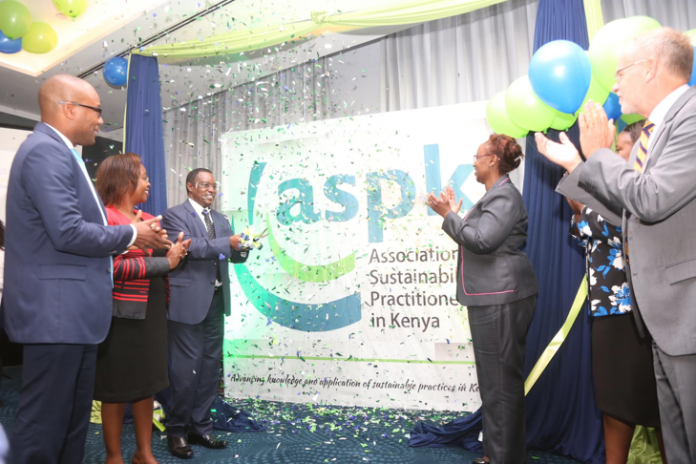Those of you who have read my articles know that I am always talking about the importance of sustainability, urging the adoption of sustainable practices, and sharing insights on how to better our journey towards a sustainable and prosperous future. However, talk without action is dead. To make a lasting impression in our pursuit for sustainability, we must act, not alone but as a group of individuals with a keen desire to achieve a more sustainable and prosperous Africa.
Two days ago, the Kenyan sustainability practitioners, business executives and managers proved that they don’t just talk, they follow through. They under-promised and over-delivered during the 2018 Breakfast Meeting on Sustainability trends that have impacted the Kenyan corporate sector. One hundred and fifty sustainability enthusiasts joined me in an event of its kind where we discussed the current sustainability trends and priorities across various sectors of the Kenyan economy. The commitment showed by various business executives in the meeting proved that sustainability is no longer a philanthropic afterthought or about installing low energy light-bulbs, but an approach to embedding more forward thinking and responsible business practice into how a business produces and delivers its goods and services.
It was clear that organizations, and especially those in the business world, have a profound interest in understanding where their consumers are heading. Corporate sustainability, employee wellbeing, sustainable supply chain management among others have become a known and relevant part of the corporate world today, with the objective of better understanding how consumers’ lives are evolving and how this can translate into innovative products and services that are beneficial to all stakeholders and the environment. These were some of the issues we discussed while attempting to dig deep into the fabric of corporate sustainability trends within the Kenyan business ecosystem.
I witnessed several proactive companies from the manufacturing sector, financial services sector, telecoms and commodity sectors making the effort to identifying relevant sustainability trends that they’d employ as one of the inputs into their innovation process. My advice to these proactive organizations is that when confronted with the new trends, they should embrace them and try to respond to them. By doing so, they are likely to become first movers or actually shape consumer behaviour (act as trendsetters) by owning such trends at the appropriate time and with the right propositions.
During the panel discussion, it was apparent that the Kenyan industry and market are changing over time. So, businesses will need to embrace dynamism. Because of that, organizations will need to follow the sustainability trends related to their businesses. Why? Because research shows that the demand for sustainable products are on the rise. Again, sustainability-oriented businesses tend to survive in the long-term.
Over and over, the history has shown us that companies that are not so good in adaptation according to their environment disappear, “not to innovate is to die” as Freeman has taught us. The task at hand, therefore, entails identifying and evaluating the relevance (and even existence) of a specific sustainability trend. Yet, even if a trend is identified and understood, a company needs to reflect on some key questions before using it as a guiding light for evolving its brand. Great brands spot powerful ideas on the horizon that resonate with their core values, and they discover ways to advance those ideas. That’s the secret of growth: being proactive by anticipating or leading the sustainability movement.
Success needs an appropriate mix of creating and following trends. It is the never-ending cycle. Organizations should endeavor to connect with the larger sustainability culture in ways that lead to more sustainable influence and impact. They should try to determine where society is heading and explore how their brands can add value in ways that are aligned with that direction. And as they forge ahead, they should make sure that they remain true to their brand and what it stands for.
Again, when confronted with such trends coupled with the rising socio-economic and environmental challenges, the role of sustainability management within organizations is becoming more complex and more central to business success. In this light, improving the organizational structures and strengthening the capabilities of sustainability practitioners is, therefore, critical to assist them in influencing and guiding their organizations in the direction of an integrated approach to sustainability across all functions.
One of the channels for achieving this includes building a platform where sustainability practitioners are equipped with a high-level understanding of sustainability practice through knowledge sharing and collaboration. The Kenyan sustainability professionals, therefore, officially launched the Association for sustainability practitioners in Kenya (ASPK)- a platform for the members to act as a crucial force for sustainability in the country while advancing sustainability innovations that create impact and generate profits within their respective organizations. This is a platform that I envisioned two years ago and nothing thrills me more than to see it come to fruition.
As we move forward, we need more business collaboration, but what we need most are well-designed, well-governed, accountable, and impactful collaborations. This was well demonstrated by the Kenyan sustainability practitioners. As we work together in improving the state of sustainability within our respective organizations, we must emphasize the need to ideate, design, and explore—and subsequently accelerate and scale—powerful collaborations that yield transformational change. We believe that the time is right to pursue such opportunities vigorously, aggressively, and with focus. We believe that the time is now. Let us all keep walking the talk.



